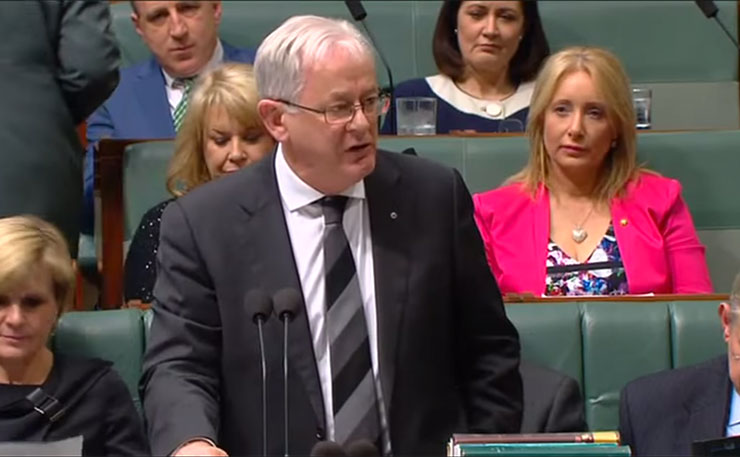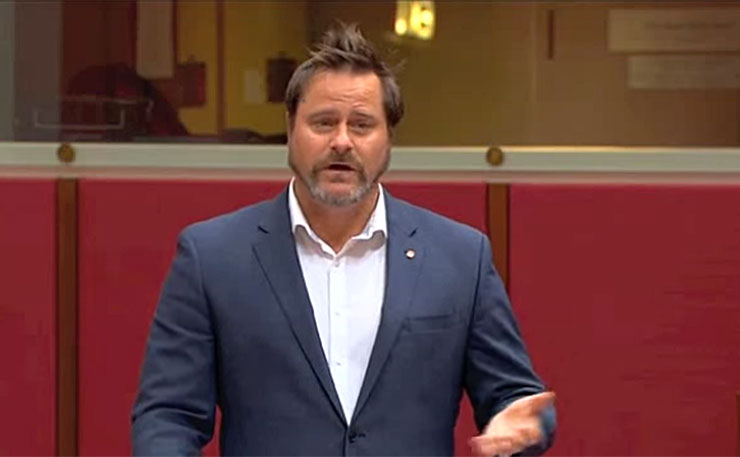By nature, international trade deals are not the most exciting of topics. Economists and the occasional environmental activist get quite worked up about them, but for the ordinary citizen it can be desperately hard to work out just what the thicket of regulations and agreements actually mean.
Matters are not helped by the secretive nature of such agreements, where the only people who seem to know what’s in the agreements are the lobbyists talking to the politicians. The Australian government didn’t even release the full details of the China-Australia Free Trade Agreement until Trade Minister Andrew Robb had already signed on the dotted line.
So it goes for the Trans-Pacific Partnership, the secretive 12-nation agreement, which Australia signed up to today. While the US, Vietnam, and several of the other countries that have signed up have trumpeted the deal as an economic game-changer, environmental groups, trade unions, health policy experts and copyright activists are not so sure. The TPP might be a fillip to economic growth. But what sovereign rights have we bargained away in the process?
Like the other free trade deals he has signed, Andrew Robb is bullish on the TPP’s prospects. He claims that it “ushers in a new era of economic growth and opportunity across the fast-growing Asia-Pacific.”
Robb’s media release today contained a laundry list of the TPP’s supposed benefits. The government argues it will open up big export markets for Australian firms delivering services in higher education, engineering, accounting, and the law. It also delivers tariff reductions and better access for Australian exporters for primary exports, such a sugar and fossil fuels. The government also claims it will allow Australian firms to compete on a level playing field against state-owned enterprises in countries like Vietnam.

Most significantly, the government argues that “the TPP creates a single set of trade and investment rules between its members – making it easier and simpler for Australian companies to trade in the region.” By harmonising rules and regulations, trade and investment should get easier, fostering economic growth. The idea is that the benefits of such a system will eventually become apparent for other countries in the Asia-Pacific, which might want to sign up to the TPP themselves.
Others are not so sure. Labor’s Penny Wong wants to see the details. And fair enough: the TPP is remarkably opaque. So far, the only time we’ve seen full details of certain bits of the TPP are via leaks to Wikileaks. The full text of the agreement will remain secret for weeks, perhaps months.
The Greens are far more sceptical. They worry that the deal will expose Australia to litigation from multinational corporations under its Investor-State Dispute Settlement (ISDS) clauses. “It’s just totally flawed,” Greens Senator Peter Whish-Wilson said this morning. “It gives the government the chance to go out and spin another ‘win-win’ trade deal that we know absolutely nothing about.”
South Australian independent Nick Xenophon agrees. “If this is such a good agreement for Australia then why all the secrecy?” he asked today in a media statement. “Despite the Government’s denials and furious sales job this morning, serious issues remain.” Xenophon points out that since signing bilateral trade deals with Singapore, Chile, Thailand and the US in the past decade, Australia’s trade deficit with all four countries has widened.
Many health policy experts worry that the drug patent provisions in the agreement might impinge on Australia’s highly-successful Pharmaceutical Benefits Scheme. The PBS is a legal monopsony in which the federal government bulk buys medications from drug companies at a negotiated price; consumers pay just a fraction of the true cost, with the rest subsidised by the taxpayer. Big American companies have long wanted to dismantle the PBS, forcing the price of drugs up.
The government claims the PBS is safe. Pharmaceutical patents are apparently not an issue in the deal that Robb signed. “Concerns that the price of medicines would increase have proven to be absolutely unfounded,” he said today.
But without the full detail of the agreement, how do we know? After all, the full text of the ChAFTA agreement contained many hidden nasties, such as clauses that would allow widespread deregulation of the Australian labour market.
Will the TPP prove to be an economic bonanza? Almost certainly not.
Economists generally agree that freeing up trade restrictions is good for economic growth. The problem for Australia is that we already have a very open and liberal economy, so most of the benefits of freer trade have already flowed. The windfall gains from tariff reduction came in the 1980s and 1990s, after Australia lowered tariffs for imported goods like cars and white goods. But you can only do this once, so there is no reason to expect an avalanche of cheap imports.
Even the hard-heads at the Productivity Commission think that bilateral and regional agreements like ChAFTA and the TPP deliver only incremental gains. “The increase in national income from preferential agreements is likely to be modest,” the Productivity Commission reported in 2010.
Recent experience backs this up.

The US-Australia free trade deal was trumpeted by the Howard government with the same sort of fanfare that is being rolled out for the TPP. But the US-Australia free trade deal has not delivered. Indeed, new analysis from the Australian National University’s Shiro Armstrong suggests it might even have made us worse off. “Australia and the United States reduced their trade with the rest of the world by US$53 billion and are worse off than they would have been without the agreement,” Armstrong wrote in August.
Nuanced economic discussion of this nature is rare in free trade debates. Proponents tend to see them as a panacea that will drive spectacular future growth; critics tend to forecast doom and gloom.
The real deficit in the TPP debate is democratic. Most Australians have little or no understanding of what this free trade deal entails.
This is partly because the economics is difficult and often boring. But it is also because government make a conscious effort to hide the details they are negotiating. A recent opinion poll by Essential on the China-Australia deal showed that most voters didn’t known enough to make a decision.
Were voters really informed about what was being bargained on in these negotiations, support for these deals may well collapse. Many people liked the idea of doing something about climate change in the abstract. When told it would drive up their electricity bills, the carbon price became quite unpopular.
This shows that Labor has an opening on the TPP, if it wants to take it. If there really was a genuine debate about free trade, the Turnbull government may find it a rather difficult argument to win. Voter support for a more open and trade-friendly economy is a delicate and equivocal thing. So, for example, while most are happy to welcome Asian students into our universities, there is widespread disquiet about foreign investment in Australian property. From time to time, the Coalition under Joe Hockey has been only too happy to stoke such xenophobic fears. Similarly, Labor seems to be getting traction with its campaign against the Chinese trade deal, pointing out that it could lead to an influx of low-paid Chinese workers.
It’s worth noting that you can be in favour of free trade, and against the TPP. You can also be pro-business, and against the TPP. Maybe the deal itself is just a bad deal. Or maybe it’s not really free trade in any case, but rather a series of preferential deals for big industries.
Attacking the TPP shouldn’t be too difficult, given that the government has signed a contract that ordinary Australians aren’t even allowed to see. In a properly functioning democracy, we’d know exactly what the agreement says, and what Australia is singing up to. The TPP shows that’s far from the reality. Labor’s Penny Wong has apparently seen a draft, but even she hasn’t seen the full text yet.
But attacking the TPP would risk the criticism that Labor is anti-business, something that Chris Bowen and the economic dries in the shadow cabinet are desperate to avoid.
It’s now up to ordinary Australians to mount a campaign. If the TPP becomes unpopular enough, Labor will think twice about voting for it. But if most people find it all a bit too hard or too complex, we’ll be saddled with a treaty that we didn’t vote for, and that we probably don’t need.
Donate To New Matilda
New Matilda is a small, independent media outlet. We survive through reader contributions, and never losing a lawsuit. If you got something from this article, giving something back helps us to continue speaking truth to power. Every little bit counts.




